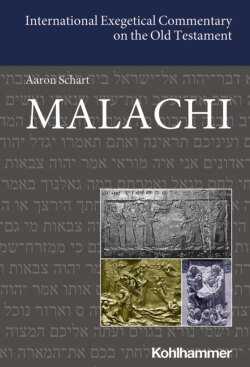Читать книгу Malachi - Aaron Schart - Страница 11
На сайте Литреса книга снята с продажи.
Poetic Analysis of the Malachi Document
ОглавлениеPoetic Analysis There is dispute over the question whether the text of the Malachi document represents poetry or “exalted prose.” Since poetic lines are more identifiable when they represent bicola, it seems best to focus on those within the framework of our analysis. A bicolon is certainly present when two cola of equal length in one line are semantically parallel to one another in synonymous, antithetical, or synthetic manner (parallelismus membrorum). Grammatical and phonetic parallelism regularly accompany this feature.
Judged according to these criteria the Malachi document contains some poetic lines, e.g., in Mal 1:2bβ//3a ; 1:3b; 1:4aγ; 4b; 1:6; 2:10a; 2:17b; 3:1a; 3:2a; 3:2b; 3:5a; 3:6; 3:7aβ; 3:8aα; 3:9; 3:11aβ//bα; 3:12a//bα; 3:14a//bα; 3:18aβ//b; 3:24a [4:6a ET]. Malachi 1:14b can serve as an example because it also reveals how the poetic structure was misread by a later redactor:
Truly, a great king am I [—Yhwh of hosts has said—] //
and my name is reverenced among the nations.
These lines express a self-predication by Yhwh. If we ignore the formula “Yhwh of hosts has said”, the bicolon contains two nominal clauses that are semantic synonyms. The first ends with “I” and the second begins with the synonymous phrase “my name.” The number of consonants is nearly identical in the two cola (12 + 13); the first contains one additional word, “truly,” כי at the beginning of the line, introducing the statement. The statement itself consists of three words, each with its own accent (3 + 3). Within the caesura between the two cola stands the formula “Yhwh of hosts has said”. That formula usually concludes preceding divine speech, yet here the words of God continue uninterruptedly in the second colon. Thus, the formula breaks the flow of thought and the poetic coherence of the line. For that reason it is probable that the quotation formula was secondarily inserted. The example shows that the basic stratum was poetic in form, but a redactor ignored the poetic shaping. We find this kind of reworking again and again, which suggests that the whole of the basic stratum was poetic in form. It is true that, despite intensive literary-critical efforts at reconstruction, some lines are left over; these are not as beautiful and balanced in form as is Mal 1:14b*, but they also have been and can be regarded as poetry.10
